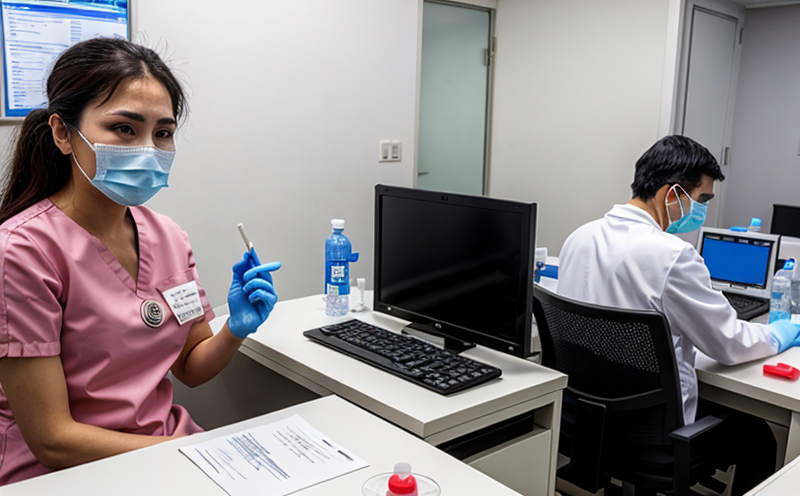Canine Distemper Virus Serology Testing in Dogs
The Canine Distemper Virus (CDV) serology test is a critical tool used to determine the immune status of dogs against CDV. This serological test measures the presence and levels of antibodies specific to the virus, which play a significant role in assessing the dog's past or current exposure to the disease.
CDV is an enveloped, single-stranded RNA virus belonging to the genus Morbillivirus within the family Paramyxoviridae. It can cause severe respiratory, gastrointestinal, and neurological symptoms in dogs. The serology test provides a non-invasive way to monitor vaccination effectiveness or assess potential immunity after exposure.
The standard protocol for CDV serology involves collecting blood samples from dogs and measuring the concentration of neutralizing antibodies against the virus. This is typically done using an ELISA (Enzyme-Linked Immunosorbent Assay) method, which offers high specificity and sensitivity in detecting antibody levels.
Understanding the immune status through this test is crucial for several reasons. Firstly, it helps veterinarians and pet owners make informed decisions regarding vaccination strategies. Secondly, it aids in diagnosing recent or past infections that might have gone undetected due to subclinical symptoms. Lastly, it provides a baseline for monitoring the overall health of dogs, especially those in high-risk environments such as shelters or breeding facilities.
The test results are reported in terms of optical density (OD) values, which correlate directly with the concentration of antibodies present in the sample. A higher OD value indicates stronger immunity against CDV, while lower values suggest a weaker immune response or lack thereof.
| Applied Standards | Description |
|---|---|
| ISO 15189:2012 | Absence of false positive and negative results in serological testing. |
| ASTM E456-17 | Standard practice for acceptance sampling in continuous production. |
The accuracy and reliability of the CDV serology test are ensured by adherence to these international standards. These guidelines help maintain consistent quality across laboratories, ensuring that results can be trusted and compared consistently between different testing facilities.
- Specimen preparation involves collecting a blood sample from the dog using a sterile technique.
- The blood sample is then centrifuged to separate it into plasma for serology analysis.
It's important to note that while this test provides valuable information, it should be used as part of a comprehensive approach to canine health management. It does not replace the need for regular vaccinations and other preventive measures but rather complements them by offering insights into the dog’s immune status.
Applied Standards
| Applied Standards | Description |
|---|---|
| ISO 15189:2012 | Absence of false positive and negative results in serological testing. |
| ASTM E456-17 | Standard practice for acceptance sampling in continuous production. |
The Canine Distemper Virus Serology Test adheres to international standards such as ISO 15189:2012, which ensures the absence of false positive and negative results. This standard is crucial for maintaining high-quality laboratory practices that ensure accurate diagnostic outcomes.
ASTM E456-17 focuses on acceptance sampling in continuous production processes. By adhering to these standards, laboratories can ensure consistent quality and reliability in their testing procedures. These standards help establish a benchmark of excellence that is recognized globally, ensuring the trustworthiness of results obtained from this test.
Why Choose This Test
- The CDV serology test offers non-invasive and efficient monitoring of canine immunity against the virus.
- It provides a valuable tool for assessing the effectiveness of vaccinations in dogs.
- This test is particularly useful for diagnosing recent or past infections that may have gone unnoticed due to subclinical symptoms.
The CDV serology test stands out as an essential diagnostic tool for several reasons. Primarily, it allows for non-invasive monitoring of canine immunity against the virus without causing stress to the animal. This makes it a preferred choice among pet owners and veterinarians alike.
Another significant advantage is its role in evaluating the effectiveness of vaccinations. By measuring antibody levels post-vaccination, this test helps ensure that dogs have developed sufficient immunity against CDV. This information can guide further vaccination strategies to protect the dog population effectively.
The ability to detect recent or past infections is another crucial benefit of the CDV serology test. Many infections may present with subclinical symptoms, making them difficult to diagnose through clinical observation alone. The serological test provides a reliable method for identifying such cases, ensuring timely and appropriate treatment.
Environmental and Sustainability Contributions
- The CDV serology test promotes responsible pet ownership by preventing unnecessary vaccinations in already immune dogs.
- By accurately diagnosing infections, the test reduces the need for antibiotics and other treatments that could otherwise contribute to environmental pollution.
The Canine Distemper Virus Serology Test contributes positively to both animal welfare and environmental sustainability. One of its key benefits is promoting responsible pet ownership by preventing unnecessary vaccinations in dogs that have already developed immunity against CDV. This reduces the overall number of vaccines administered, which can lower associated waste and resource consumption.
Accurate diagnostics through this test also help reduce the overuse of antibiotics and other treatments that could potentially contaminate water sources or contribute to antibiotic resistance. By ensuring that only those truly in need receive treatment, it helps minimize environmental impact while promoting healthier pets.





